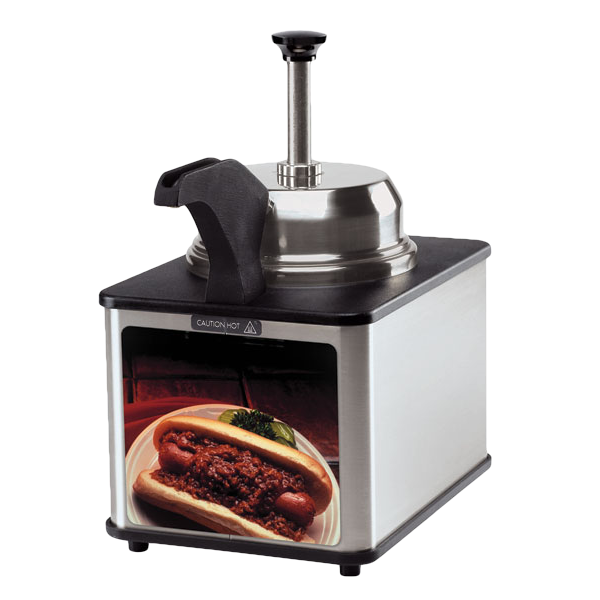As requested by @wtypstanaccount04@hexbear.net
The Space Shuttle, the iconic American launch vehicle used from 1981 to 2011, is the worst thing that has ever happened to space exploration, rivaled only by the world historic tragedy of the breakup of the USSR. The Shuttle is responsible for 73.6% of all deaths in the entire history of spaceflight and the Shuttle program and its consequences have crippled the crewed space launch capability of NASA to a current state worse than during the Mercury program in the early 60's.
How did this happen? In short, Nixon, Congress and the Department of Defense.
So it's 1969, Armstrong and Aldrin are standing on the moon, Richard Nixon is President, and the US declares victory in the space race after posting a wall of L's on every previous step of the race. Nixon tells NASA to make a plan for what to do next after the Apollo program and they come back with this pretty cool plan they call the Space Transportation System, or STS for short.
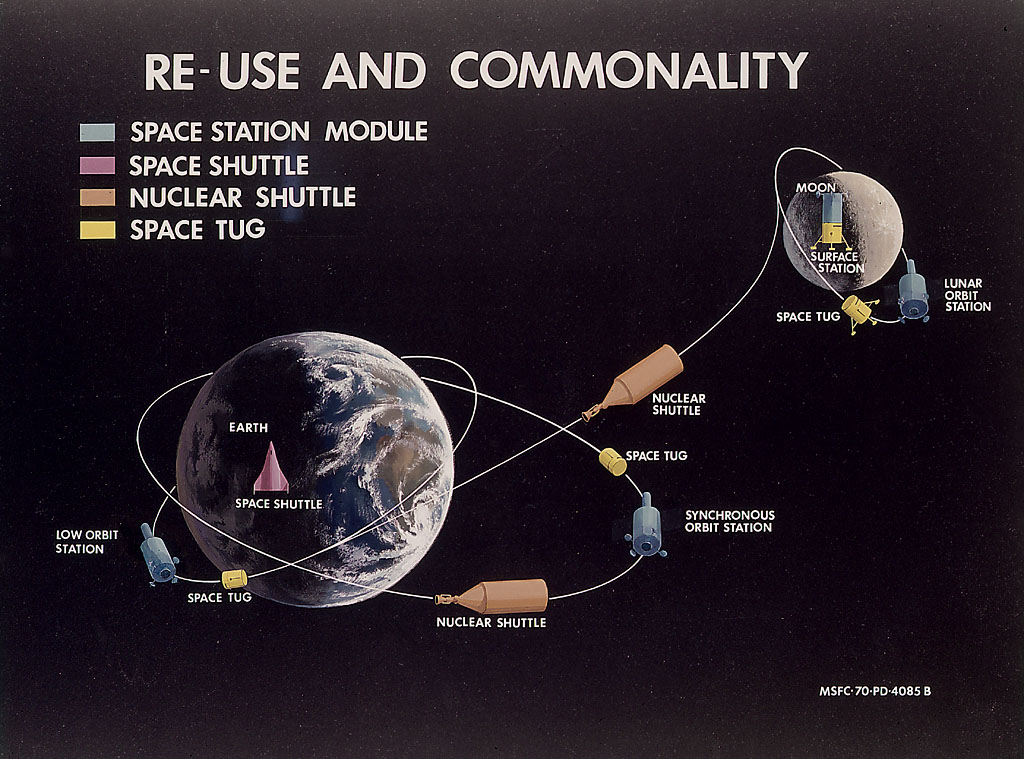
The idea is that you build a whole reusable modular infrastructure of space vehicles and stations for missions to orbit, to the moon, and eventually to mars by 1983 at the earliest and 2000 at the latest. This system consists of several parts:

- A two stage fully liquid fueled fully reusable winged shuttle to get up to low earth orbit
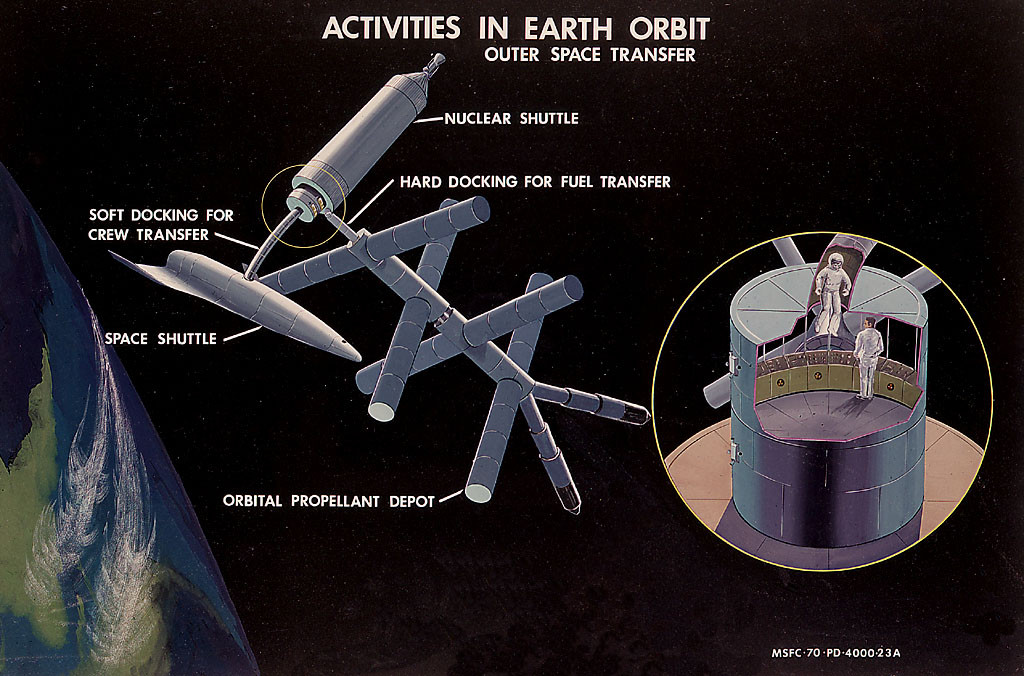
- A modular space station there in orbit along with a fuel depot to do microgravity stuff and to transfer crew and cargo from one vehicle to another.
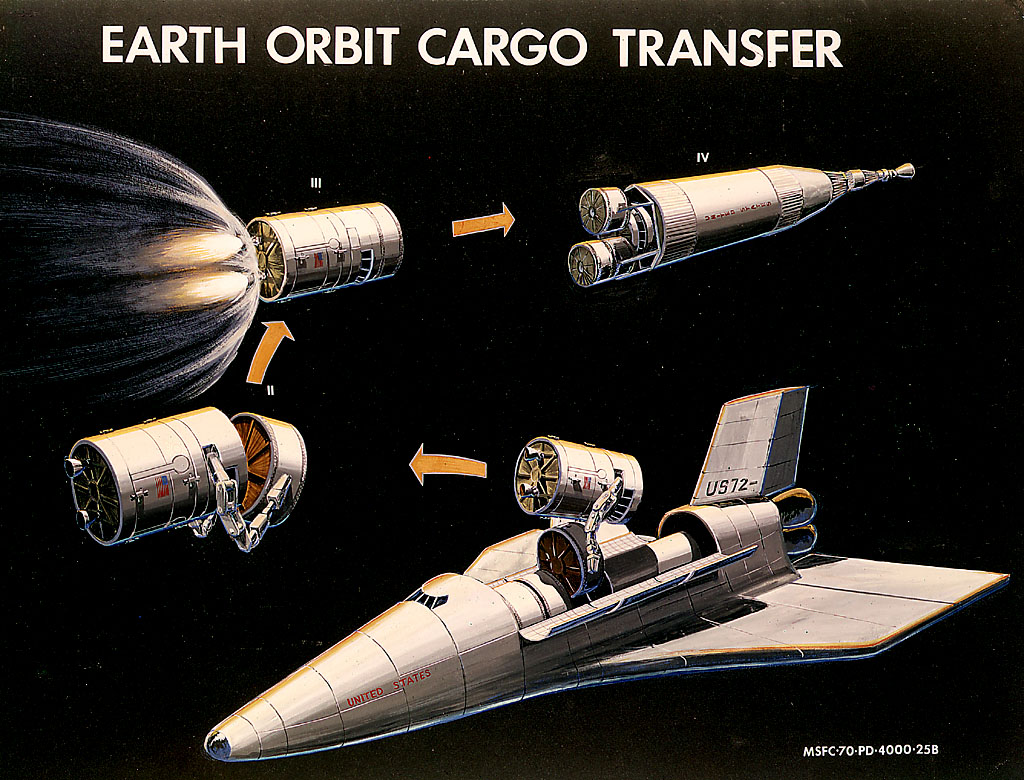
- Some space tugs to move stuff around, with the bonus that if you stick some landing legs on one it'll work as a lunar lander.
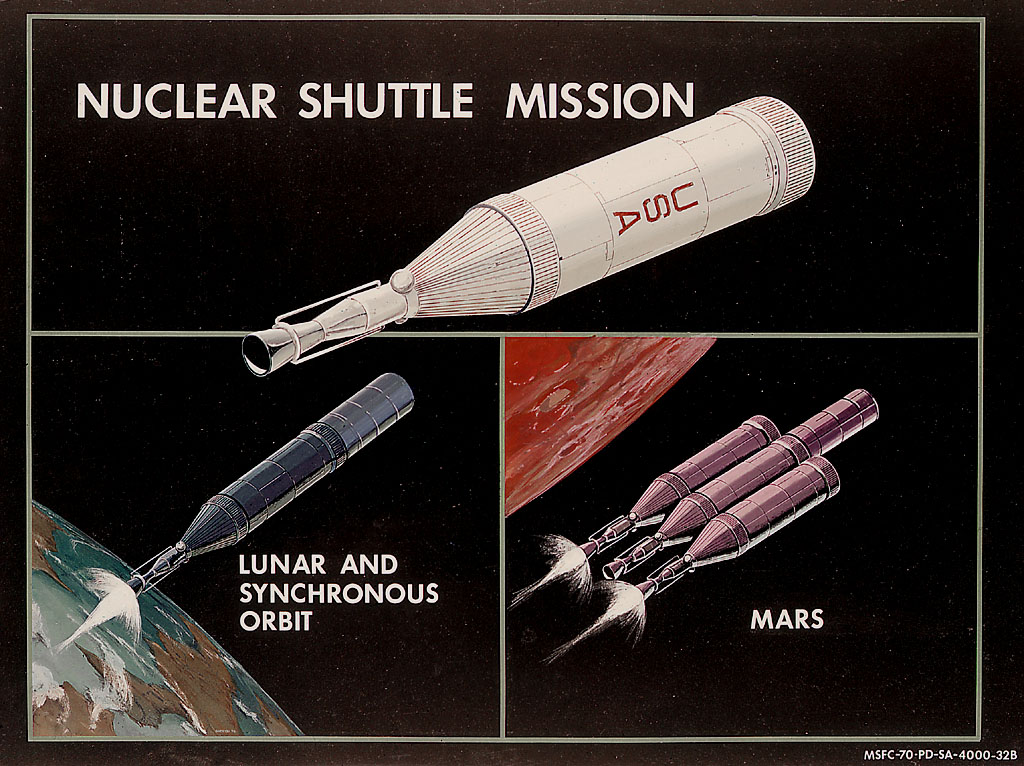
-
A nuclear powered space-only shuttle with no wings or anything but a fuel tank, nuclear rocket engine, and module attachment points, capable of getting back and forth between the earth and moon. Stick a few of em together and you can reach mars.
-
Finally, a second modular space station in lunar orbit made of the same modules as the first one to manage all the cool lunar exploration we're definitely going to be doing.
So, design four things and you get a whole cheap reusable space infrastructure for the entire earth-moon system and all you need is a bigger new lander to include mars in the bargain. Fantastic deal, one of the best deals of all time.
This is where it all starts to go horribly wrong.
Of course Congress refuses to fund, and Nixon cuts, everything but the winged atmospheric shuttle, leaving it with nowhere to go, a bus to nowhere. NASA's reward for going from putting their first person in space to putting people on the moon and bringing them back safely in eight years is having their budget cut drastically.
But the cutting don't end there. No, that would be a good bus to nowhere and we can't have that. We get the shitty bus to nowhere. Look back up at that Shuttle concept pic above. See how both parts have wings and engines? See how there aren't any solid rocket boosters on it? All that stuff costs money up front and we can't have that. Sure, it makes the system cheaper to use and more reliable and safer but who cares about that we gotta get the sticker price down. Vietnam isn't gonna bomb itself.
It's time to start fucking up the shuttle itself.
Okay, we lose the reusable winged first stage and replace it with a big dumb disposable fuel tank to save money. That means that in order to reuse the first stage engines they have to be put on the orbiter. But the orbiter is off axis to the center of mass of the whole stack, by a lot and also by an amount which changes a lot as the fuel gets used up. This means the engines have to be able to gimbal really far while at a full burn, making the engines even more complex, which in turn makes the engines even more expensive and makes them need to be refurbished and pretty much completely rebuilt after every flight.
Oops, now we need more boosters because the engines on the orbiter aren't enough. We could use liquid rocket boosters which are much safer and cheaper per launch, but the Office of Management and Budget, who you may notice are not rocket scientists, say we have to use solid boosters to save money on up front development costs.
Let's have a quick aside here to explain very simply how rockets work, both liquid and solid. A liquid rocket has two big tanks of very cold liquid, one of fuel, most commonly liquid hydrogen or kerosene, and one of oxidizer, most commonly liquid oxygen. It pumps these down into a combustion chamber where they combine and explode, sending a jet of hot gas consisting of either steam in the case of hydrogen fuel, or steam and carbon dioxide in the case of kerosene out of the back to push the rocket forward. If something seems to be going wrong, computers can sense that and stop pumping more fuel and oxidizer into the combustion chamber. A liquid rocket that fails in flight generally just stops burning with an accompanying loss of thrust. This is bad, but usually nothing explodes that shouldn't.
Solid rockets are completely different. Instead of having tanks and a combustion chamber a solid rocket consists of fuel and oxidizer formed into a solid block coating the inside of a tube with a hole down the whole middle of the tube. The fuel is commonly metal or plastic particles and the oxidizer is commonly some nasty stuff like ammonium perchlorate. In the case of really big solid rockets like the shuttle now uses, the tubes are manufactured in vertical sections and sealed together with o-rings. Once you light a solid rocket, the whole middle of the tube is burning all along its length, and it cannot be shut down. The exhaust is all kinds of toxic and still burning shit so even if you detach them, they fly off still burning and you get washed with all that deadly exhaust.
Great, now instead of a fully reusable two stage rocket that runs on hydrogen and oxygen with a first stage that can land back at an airport we have a rocket you have to rebuild after every flight that needs a disposable external fuel tank and solid rocket boosters you have to fish out of seawater to reuse.
As we're doing all that redesigning, the budget just keeps getting cut so now we have to go beg the Department of Defense and the National Reconnaissance Office for money. What they want is a bigger payload bay and bigger wings. Why do they want those things? First, to launch bigger spy satellites. Second, they have this bazinga brained idea that they can fly up into a polar orbit, snag a Soviet satellite out of space, and land back on US soil within one orbit. But the Earth moves as you're orbiting, so in order to launch from Florida and land back at Vandenberg you have to have a lot of wing area too, so you can glide further and not end up in the Pacific. This is a very stupid idea, and would have been an act of war if they ever actually tried it, which they thankfully didn't, but all that extra payload space and wing area adds weight we have to lift every time we launch.
Next let's think about the crew: how many of them should we have and how will we keep them alive if something goes wrong? Apollo (and Soyuz) have a launch escape system that can pull the crew module right off the stack the instant something goes bad and fling them far away, but you can't do that with the whole nose of a spaceplane. We could maybe have ejection seats, but then we only have room for four crew, and we want seven. For the first few testing flights where we only need a pilot and copilot we give them ejection seats but once we start flying full crews it's a pretty bad look to leave the other five behind so we take those ejection seats out.
So here's the plan if something goes wrong:

The bars are timelines of launch, the black zones are where if something goes wrong at that part everybody dies. Note how most of it is black zones. Now, if something goes only a little bit wrong we can try to return to the launch site, but let's not test whether that actually works because in the words of the guy we got to fly the damn thing first, Astronaut John Young, "let's not practice Russian roulette" and "[the Return To Launch Site abort] requires continuous miracles interspersed with acts of God to be successful."
This whole mess works okay, in the sense that nobody dies, for 24 whole launches. This lulls us into a false sense of security, and we start to do some even dumber things, like assume that when the o-rings holding the solid rocket booster sections together burn through a third of the way it's fine and we can save a little bit more money by not redesigning them so they don't burn through. We also get really focused on keeping the cadence of launches up to prove to Congress that we can do things quickly and efficiently and most importantly cheaply.
On the morning of January 28, 1986, all our chickens come home to roost at once. Before the launch, we get a call from Morton Thiokol, the manufacturer of the solid rocket boosters, telling us that it is not safe to launch because the o-rings (the same o-rings we have been letting get burned through) tend to harden and shrink in cold weather and won't seal the joints between sections well enough to keep the unstoppable explosion contained and pointed in the right direction. Shuttle program manager, Lawrence Mulloy, does not like this. "My God, Thiokol," he says. "When do you want me to launch — next April?"
We ignore this last possible chance to avert tragedy and launch anyway. This is a very bad move, and immediately more than doubles the number of deaths in spaceflight total ever in history. One of the o-rings in one of the solid rocket boosters fails in exactly the way Morton Thiokol engineers predicted it would and sends a new unplanned jet of flame out the side of the solid booster and into the side of the external fuel tank, which makes it explode. This means we will not go to space today. Worse, because the shuttle has no launch escape system it means everybody dies.
To be continued...
For more space tragedy news, look up Richard Shelby, an American senator who may have single-handedly crippled NASA more than any other human being alive.
I will absolutely look into him and include what I find in part 2
Probably his most damaging actions were regarding orbiting fuel depots. Basically his major aerospace campaign donors made sure that he made sure that this sort of money-saving idea was never implemented. And because he dictated how NASA spent money, that was that. It's only now that he's gone that NASA has dusted off plans involving fuel depots.
Interesting, my preliminary look into him mostly found his more recent activities of pushing the SLS hard. The SLS is its own whole chapter of how the shuttle ruined everything.
Yeah, the SLS is a complete boondoggle.
On the bright side, we'll never have to see that ridiculous Constellation-program Ares 1 deathtrap kill a crew.
Yeah entirely solid first stage on a crewed vehicle is madness, but it's the same legacy of shuttle derived hardware behind both
Wow, this is fascinating. I've heard that there were criticisms of the Space Shuttle program, but this reconciles it with America Brain to the point where I can see the entire endeavour for the colossal fuckup it was.
Thanks for this. I'm looking forward to more.
All space colonization is a colossal fuck up. Let’s remain in earth picking nuts and berries instead paying for a billionaire to mine water on some far flung space object in our solar system that we will never be able to go to.
A sustained, planned, and moderate investment in the space industry will allow all of our descendants to enjoy incredible comforts under 23rd century communism... or we could just stay at roughly 21st century living standards forever.
edit: As an example, there is certainly enough energy on Earth to guarantee ten billion people access to the same amount of electricity as Americans get. But eventually you start producing so much energy that you're cooking Earth with waste heat instead of CO2 emissions. The only way around that is to exploit space.
Humanity can remain an industrialized society while decreasing consumption significantly, and space has little to do with that transition. The human need for space is nothing more than satellites, we will never need a white man on Mars, we will never need astroid mining or manufacturing, we don’t need deep space probes, we don’t need a human in space, we don’t need a space station. All investment in space is military investment, all space programs are military programs. While cutting space programs will hurt scientific progress, demilitarization is preferable. If we had a ww3 there would be huge scientific breakthroughs, it wouldn’t be worth it though, not unless the left would unambiguously win that war, and we wouldn’t want to have that war for science.
And say communists did gain full control, space would not be their priority. We would cancel all the moon missions, we would axe basically all the shit nasa is doing, the entire planet could be serviced by a few spaceports. In 1000 years there would probably not be a man on mars still as there will always be a more important issue on Earth. The only reason the Soviet Union developed a space program was that the nazis fired rockets at them and had to develop it defensively. Humanity’s scientific advancement in a communist society would be focused on more mundane things if there is no pressure from reactionary forces. The good future is one with no ai, no space, no megaprojects. Stagnation would be good.
paying for a billionaire to mine water
This is the capitalist realism approach to space exploration
Thank you for this post. I enjoyed reading it and learning more about this topic.
It is the investor class that owns the politicians that kneecap our ability as a people to end manufactured scarcity. That is what happened to NASA.
Imagine if we funded NASA instead of all these middle east wars.
The Space Shuttle is to Space Exploration what Monopoly is to Board Games. Not merely bad, but so bad that it held back the entire field for decades due purely to it's bad reputation.
yeah but have you considered that I have consumed entirely too much star trek at an impressionable age, ergo space shuttle good
Space shuttle is actually an impediment to the Star Trek future

FANTASTIC post! Thank you so much for putting in the time. I learned some stuff today and now also hate the space shuttle program and will be telling other people about this. Space is the place and anyone fucking up us going out there and looking at shit is bad.
The whole concept of crewed space travel using rockets of any type (including shuttle) is flawed and will never work, it's too expensive, not good for the environment, and not scaleable. Humans have no business going to space, it's just a flag waving contest. Aerospace engineers have known this is a scam for decades and there's been little/nothing done about it. China might do it someday, we'll see. The only way to get to the next step is to build StarTram, the world's first international space launch port, up the side of the highest equatorial region mountain. If we do that, and reduce the cost per lb by 99%, we can build self-assembling modules in space and then send them out to mine the asteroid belt for rare earth metals, which are incredibly important for the next phase of human civilization. None of this will ever happen, and humans will be extinct before it does. Hell, humans will probably go extinct before even making it to Mars, not that we have any reason what-so-ever to send humans to mars and we shouldn't be holding that up as something to aspire towards.
https://en.wikipedia.org/wiki/StarTram
Call me a doomer, but I don't think humans have even 1,000 years left without major sociological revolution that focuses on the welfare of humanity and the planet.
It could definitely happen. Civilization will first collapse, maybe some humanity might hold on. We'll see 500 PPM CO2 by 2040. It's right around the corner. Mass starvation and die offs of billions, may lead to resource wars, and then all bets are off.
We're blowing past every climate change target (we've already had one year over 1.5C well ahead of schedule) and actively making it worse. In the west, our governments alternate between hoping there's a magic scalable tech solution which likely doesn't exist and explicitly doing nothing (
 ) because line go up. Climate change will result in, among other things, mass migration and skyrocketing food prices. This leads to political instability and (if the response to COVID and the Syrian refugee crisis are anything to go by) an increase in fascist sentiment, especially in the imperial core. I think it's highly likely to see a nuclear war kick off in this scenario (most likely India/Pakistan, but it could also be Israel, the US, the UK, France, etc).
) because line go up. Climate change will result in, among other things, mass migration and skyrocketing food prices. This leads to political instability and (if the response to COVID and the Syrian refugee crisis are anything to go by) an increase in fascist sentiment, especially in the imperial core. I think it's highly likely to see a nuclear war kick off in this scenario (most likely India/Pakistan, but it could also be Israel, the US, the UK, France, etc).me reading the Foundation series and looking outside, watching this science fiction story play out in miniature and real time
It's going to take hundreds of years for oceans to heat up and ice to melt.
I hate to break it to you, but that's happening now.
Okay, you're talking about the delay between a change in one year versus the effect that could be directly attributed to the change. Gotcha.
we dont need the asteroid belt for rare earths, we got lots of it here. unless youre talking about mining and refining it up there to be used solely up there.
The only good thing about the space shuttle is that one Cowboy Bebop episode, and that is science fiction lol
10/10 post. When I got into space stuff many years ago really grappling with how terrible the Space Shuttle was was a bitter pill to swallow - but there's a reason that the Soviets abandoned Buran after a single launch, realizing that it was a big dangerous waste of time compared to iterating on the most reliable human launch system ever designed (Soyuz).
Buran was better, it sidestepped several of the worst design flaws of the shuttle by not having solid boosters and by putting the main engines closer to the center of mass line, as well as by being able to be flown uncrewed. But it still had an expendable first stage and no launch escape system. Its biggest problem though was that the Zenit booster was from the Ukraine SSR and the first launch was in 1988.
and by putting the main engines closer to the center of mass line
To clarify, one of the major differences between the Space Shuttle and the Buran is that the latter does not have its rocket engine built into the orbiter, as did the Space Shuttle (RS-25). Instead, Buran only had a small propulsion engine (17Д12) which was used for orbital trajectory correction.
As such, the orbiter did not have to do anything unlike the Space Shuttle which had to gimbal its engine to compensate for the offset center of mass. Instead, the Energia rocket (the “A” block which consisted of the 4 side boosters, and the “C” block i.e. the main body of the engine) offset opposite the payload (the Buran orbiter or anything they wanted to carry).
Additionally, the Buran had an advanced automated control system that automatically takes control and compensates for the effects of off center of mass line. You can actually watch the Energia-Polyus launch video here where it tilted 3 degrees in the pitch for the first few seconds before the automatic stabilization mechanism was engaged and corrected its trajectory.
From buran.ru:
One of the features is the asymmetry of the rocket and the associated eccentricity of the equivalent thrust forces of the engines. Due to this circumstance, the missile, even in the absence of any additional disturbances, has a moment that deploys the missile in an uncontrolled area. As a result, during the first Energia flight test, by the time the stabilization machine was turned on, the rocket tilted 3 degrees in the pitch plane, which was noted by many experts who even watched the launch on TV.
I found a YouTube link in your comment. Here are links to the same video on alternative frontends that protect your privacy:
If built, the Energia-2 booster would have flown back. But that was just a proposal. By the way, what's the deal with the heat shield tiles? Space Shuttle's were a failure, I presume the Buran's weren't much different, and now SpaceX has succumbed to using them as well.
The biggest problem with the space shuttle heat tiles is that they were 1) exposed during launch, and 2) downstack from other parts which fell off sometimes. Dragon's heat tiles avoid both issues, and the huge bastard thing that keeps exploding sidesteps the second one.







